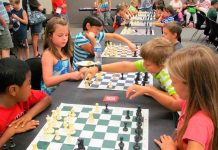Dream school
Урок проводится в 8 классе по УМК О.В.Афанасьевой в рамках темы “Education: the world of learning”.
Основная цель: Совершенствование речевых навыков в рамках темы «Школа и образование», обобщение лексики по теме.
Сопутствующие цели:
-
Совершенствование умения работы с текстом с целью извлечения конкретной информации, умения использовать новую лексику в устной и письменной речи, умения работать в группах и парах;
-
Развитие логического мышления, творческого воображения, внимания, памяти;
-
Расширение лексического словаря учащихся;
-
Воспитание чувства ответственности, взаимопонимания, терпимости.
Ход урока.
-
Организационный момент. Объявление темы урока. Речевая разминка в форме беседы. Цель – настроить на речевую деятельность).
Teacher: Hello, students. Today we shall speak about school and school life. We also will try to think of an ideal school or a school of your dream.
-
To begin with I’d like to know if you have or had any favourite subjects at school.
-
And what are your least favourite subjects?
-
Why do (don’t) you like these subjects?
-
Работа в парах. Анаграммы. ( Цель – дополнительная мотивация к работе через игровой момент).
Teacher: Have a look at the blackboard. In pairs unjumble these anagrams. The first pair to finish will write the results on the blackboard.
-
STORYHI
-
GRAGEOPHY
-
THAMS
-
SICUM
-
LISHNGE
Answers: 1 History, 2 Geography, 3 Maths, 4 Music, 5 English
Teacher:
-
What else do you study at school?
-
Are there any obligatory subjects?
-
What exams do students usually take before they leave school?
-
What do you know about official school exams in the UK?
Answers. Full-time education is compulsory for all children aged between 5 and 16 in the UK. Students can then continue their secondary studies for further two years. Students usually do GCSE exams at the age of 16, then A-level at 18.
-
Работа с текстом. Чтение. Цель – овладеть лексикой текста, высказать свое мнение по тематике прочитанного, придумать свою версию «идеальной школы» используя изученную лексику.
Teacher: Now we are going to read the text called ‘Dream School’. You may work in pairs and discuss the items. Try to predict which of the following the text might be about:
-
A dream interpretation school
-
A perfect school
-
A school where pupils learn while they are sleeping
Teacher: Look through the text and check your predictions. You’ll have two minutes.
(B ‘A perfect school is the correct answer)
Task 1: Dream school
Dream school
Everyone in Britain knows Jamie Oliver, the multimillionaire TV chef. But
when he left school at 16 with just 2 GCSE qualifications his teachers didn’t
imagine that he would become so famous a few years later. Jamie’s school
experience is unfortunately not unusual. In the UK, 47% of young people
leave school at 16 with very few qualifications.
Jamie is now on TV again in the documentary series Jamie’s Dream School.
The programme tries to create the school that Jamie wanted when he was
younger. A class of 20 kids aged 16-18 are taught subjects by a team of
experts in their field including hip hop vocalist Tinchy Stryder and around-the-world sailor Ellen MacArthur. The idea is to inspire the young people to
become interested in learning, to feel positive about school and to encourage
them to stay in education. If you want to go to Dream school you can see
clips of this fascinating show on YouTube.
What’s your idea of a Dream school? A newspaper asked school students to
describe their ideal school. These were some of the things that the children
wanted:
A flexible timetable
Time to understand things
Speakers that play music instead of a bell
A teacher-pupil swap day
A very big door so that everyone cango into school together
Tables in the playground
More flexibility to choose subjects
Better whiteboards
A bigger building
More stationery for pupils
Longer ICT lessons
Nice, smiling teachers
Friendly children
Teacher: This time you are reading the text again for details and do task A. Make notes in your exercise books.
A) Read the text again and decide if these statements are true or false.
1 Jamie Oliver is famous for cooking.
2 Jamie passed a lot of exams at school.
3 Jamie’s Dream school is a reality TV programme.
4 Jamie wants to help young people to learn more at school.
5 The teachers at Dream school are education experts.
6 School children told a newspaper that they want more discipline but no
exams.
Teacher: Let’s check up your answers.
Answers Task 1 A: 1true, 2 false (2 GCSE qualifications), 3 true, 4 true, 5 false
(experts in their field), 6 (exams and discipline are not mentioned)
Teacher: You see that the text has got a lot of words connected with school and education. Your task will be to find these words. We shall work in groups of three students and then compare your findings.
B) Underline all the words in the text related to school and education. How
many words can you find?
Suggested answers Task 1 B:
Dream school
Everyone in Britain knows Jamie Oliver, the multimillionaire TV chef. But when
he left school at 16 with just 2 GCSE qualifications his teachers didn’t imagine
that he would become so famous a few years later. Jamie’s school experience
is unfortunately not unusual. In the UK, 47% of young people leave school at 16
with very few qualifications.
Jamie is now on TV again in the documentary series Jamie’s Dream School.
The programme tries to create the school that Jamie wanted when he was
younger. A class of 20 kids aged 16-18 are taught subjects by a team of experts
in their field including hip hop vocalist Tinchy Stryder and around-the-world
sailor Ellen MacArthur. The idea is to inspire the young people to become
interested in learning, to feel positive about school and to encourage them to
stay in education. If you want to go to Dream school you can see clips of this
fascinating show on YouTube.
What’s your idea of a Dream school? A newspaper asked school students to
describe their ideal school. These were some of the things that the children
wanted:
A flexible timetable
Time to understand things
Speakers that play music instead of a bell
A teacher-pupil swap day
A very big door so that everyone can go into school together
Tables in the playground
More flexibility to choose subjects
Better whiteboards
A bigger building
More stationery for pupils
Longer ICT lessons
Nice, smiling teachers
Friendly children
Teacher: Now I’d like to know about your concept of an ‘ideal school’. But first let’s see what the British children think is important when they speak about it.
C) Read the ‘ideal school’ list in paragraph 3. Write a tick (✓) if you agree
or a cross (x) if you disagree. Compare your list with a partner.
-
Письмо. Работа парах. Написание эссе на тему «Школа моей мечты». Цель – использование лексики текста в письменной речи, обобщение идей и закрепление письменных речевых клише.
Teacher: Before you do the last task and prepare short presentations on the topic ‘My Dream School’ let’s decide which of the items on the ‘ideal school list’ in the text
relate to students (e.g., friendly children), teachers (e.g., nice, smiling
teachers), facilities (e.g., better whiteboards), materials (e.g., more
stationery), the school building (e.g., very big door), discipline (not
mentioned in text), exams (not mentioned in text).
Task 2: My dream school
A) Design your ideal school with a partner. Make some notes.
Facilities
Materials
School building
Exams
Discipline
Teachers
Students
Other
B) You are going to present your ideal school to the class. Use your notes
to prepare a mini presentation.
Useful language:
Our ideal school is/has…
We think that…
We would like more/less…
And that’s all.
-
Заключение. Подведение итогов. Цель – прослушать презентации и решить, чьи выступления были самыми интересными.





